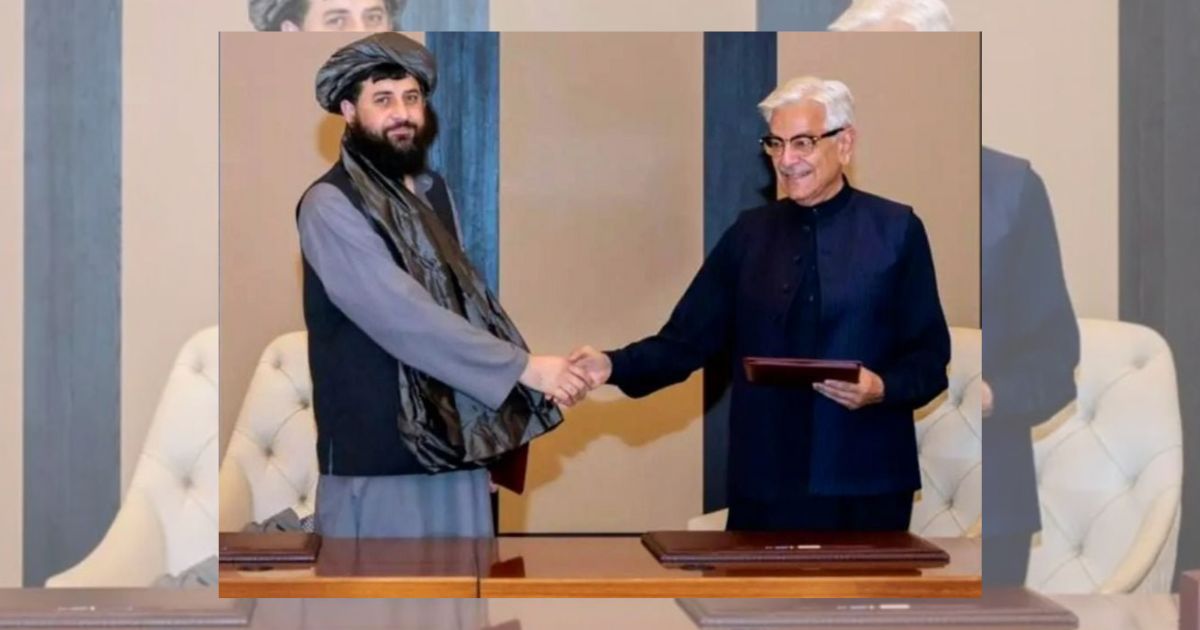Pakistan and the Taliban government of Afghanistan report that they have signed a short-term ceasefire after new border fighting and reported Pakistani air raids on Kabul and Kandahar.
The two sides said that the other side initiated the 48-hour ceasefire, which Pakistan said was in effect from 13:00 GMT on 15th October.
Earlier, a Taliban spokesman claimed 12 civilians were killed and over 100 were injured by Pakistani firing. Both sides accused each other of sustaining heavy casualties. None of the fatalities could be independently verified.
Violence erupted since blasts shook Afghanistan last week, for which Kabul blamed Islamabad. The Taliban reject allegations that they are sheltering militants who attack Pakistan.
Wednesday began with both sides accusing one another of starting the fatal confrontations.
Pakistan’s military claimed its troops had killed “15-20 Afghan Taliban” and wounded many in the Spin Boldak border district. The Taliban spokesman for the government asserted that many Pakistani soldiers were killed.
Later in the day, bombings in Kabul and Kandahar escalated tensions. Within an hour, Pakistan announced the ceasefire.
“Over this time, both sides will make genuine efforts to reach a constructive solution to this intricate but resolvable problem through positive dialogue,” its Foreign Office stated.
The Taliban government spokesman reported Afghan forces had been told to observe the ceasefire “as long as no one wages aggression”.
Pakistani state media announced its armed forces had conducted air raids on targets within Kandahar province and Kabul.
There has been no public admission by the Pakistani military and no confirmation by the Taliban government, whose spokesman on X tweeted that an oil tanker and a generator exploded, but did not attribute the explosions to fighting with Pakistan.
Taliban administration sources, nevertheless, informed the BBC that Kabul had been targeted by two air attacks. Black smoke could be seen billowing over the capital, and some streets were sealed off by the Taliban authorities.
Kabul’s emergency surgery center informed that it had treated 40 individuals following the explosions – five were pronounced dead upon arrival.
The two groups are not only battling it out for dominance along the border, but on social media as well, attempting to persuade the people that their side is causing more harm.
The most recent violence follows intense border clashes at the weekend, during which the Taliban reported killing 58 Pakistani soldiers and Islamabad killing 200 “Taliban and allied terrorists”. The BBC could not independently confirm the number of dead given by both sides.
Wednesday’s violence broke several days of tenuous calm.
Videos claiming to be of the battle and its consequences have been uploaded online and to groups on messaging sites, including videos claiming to be of those who were killed and low-quality shots from night vision cameras claiming to be of check posts that were destroyed. The videos have not been checked by the BBC.
An Afghan in Spin Boldak was quoted by the BBC as saying that battles erupted at about 04:00 local time (23:30 GMT on Tuesday). Another resident of Spin Boldak, residing roughly one kilometre from the border crossing, informed the BBC that “very heavy clashes continued for almost five hours”.
“I see drones and jets flying over us; some of our relatives are wounded,” they explained.
A physician at one of Spin Boldak’s hospitals said he tallied “seven bodies and 36 wounded brought to the hospital,” men, women, and children.
It was “tense,” and additional casualties were being brought to the hospital, he added.
A Spin Boldak local Taliban official informed the BBC that “hundreds of families have been displaced since last night due to the heavy clashes”. He informed them that they were on “high alert” following the attacks on a Saturday, when a few Taliban posts were attacked by Pakistani jets. He added that they had two bodies of Pakistani military members.
In a preceding overnight encounter on Pakistan’s north-western frontier, the Pakistani army stated that 25 to 30 Taliban and Pakistani Taliban militants were “suspected” to have been killed.
The exchanges have attracted calls for restraint from other nations such as China and Russia, as well as a proposal by US President Donald Trump that he might intervene to mediate peace.
On Wednesday, Richard Bennett, the UN special rapporteur for the situation of human rights in Afghanistan, posted on X that he was “deeply concerned” by accounts of civilian casualties and displacement due to the fighting.
“I urge all parties to use utmost restraint, spare civilians, and respect international law,” he posted.
Pakistan has long complained that the Afghan Taliban allowed the Pakistan Taliban to use their territory and wage war against the Islamabad regime in efforts to impose a strict Islamic-led system of government.
The Afghan Taliban government denied this at all times.




